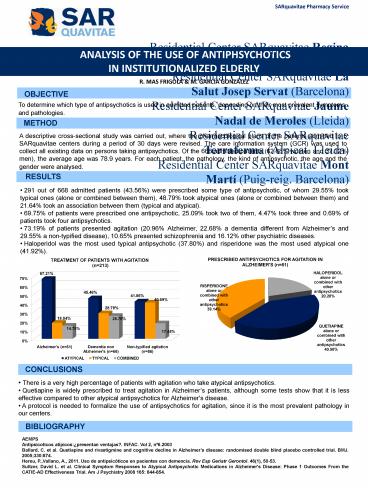Sin t - PowerPoint PPT Presentation
1 / 1
Title: Sin t
1
SARquavitae Pharmacy Service Residential
Center SARquavitae Regina (Barcelona)
Residential Center SARquavitae La Salut Josep
Servat (Barcelona) Residential Center SARquavitae
Jaume Nadal de Meroles (Lleida) Residential
Center SARquavitae Terraferma (Alpicat.
Lleida) Residential Center SARquavitae Mont Martí
(Puig-reig. Barcelona)
ANALYSIS OF THE USE OF ANTIPHSYCHOTICS IN
INSTITUTIONALIZED ELDERLY
R. MAS FRIGOLA M. GARCÍA GONZÁLEZ
To determine which type of antipsychotics is used
in admitted patients, depending on their most
prevalent symptoms and pathologies.
A descriptive cross-sectional study was carried
out, where the pharmacological plans of the
patients admitted to 5 SARquavitae centers during
a period of 30 days were revised. The care
information system (GCR) was used to collect all
existing data on persons taking antipsychotics.
Of the 668 admitted patients (62.88 women and
37.12 men), the average age was 78.9 years. For
each patient, the pathology, the kind of
antipsychotic, the age and the gender were
analysed.
- 291 out of 668 admitted patients (43.56) were
prescribed some type of antipsychotic, of whom
29.55 took typical ones (alone or combined
between them), 48.79 took atypical ones (alone
or combined between them) and 21.64 took an
association between them (typical and atypical). - 69.75 of patients were prescribed one
antipsychotic, 25.09 took two of them, 4.47
took three and 0.69 of patients took four
antipsychotics. - 73.19 of patients presented agitation (20.96
Alzheimer, 22.68 a dementia different from
Alzheimers and 29.55 a non-typified disease),
10.65 presented schizophrenia and 16.12 other
psychiatric diseases. - Haloperidol was the most used typical
antipsychotic (37.80) and risperidone was the
most used atypical one (41.92).
- There is a very high percentage of patients with
agitation who take atypical antipsychotics. - Quetiapine is widely prescribed to treat
agitation in Alzheimers patients, although some
tests show that it is less effective compared to
other atypical antipsychotics for Alzheimer's
disease. - A protocol is needed to formalize the use of
antipsychotics for agitation, since it is the
most prevalent pathology in our centers.
AEMPS Antipsicoticos atípicospresentan
ventajas?. INFAC. Vol 2, nº6.2003 Ballard, C. et
al. Quetiapine and rivastigmine and cognitive
decline in Alzheimers disease randomised double
blind placebo controlled trial. BMJ.
2005330874. Hereu, P.,Vallano, A., 2011. Uso de
antipsicóticos en pacientes con demencia. Rev Esp
Geriatr Gerontol. 46(1), 50-53. Sultzer, David L.
et al. Clinical Symptom Responses to Atypical
Antipsychotic Medications in Alzheimer's Disease
Phase 1 Outcomes From the CATIE-AD Effectiveness
Trial. Am J Psychiatry 2008 165 844-854.































